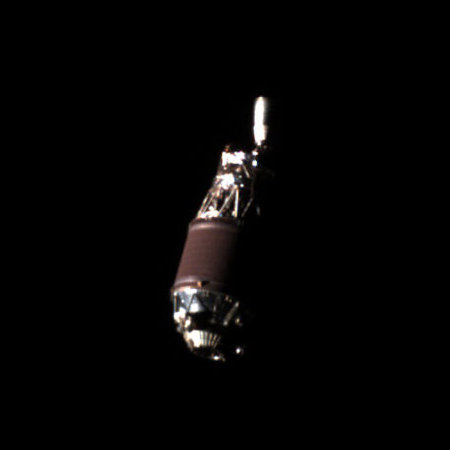ADRAS-J gets within 50 feet of abandoned rocket stage

Image taken during ADRAS-J’s initial approach in April 2024.
Click for original image.
The demo maneuvering spacecraft ADRAS-J, built by the Japanese orbital tug startup Astroscale, has successfully maneuvered to within 50 feet of the abandoned rocket stage that the company hopes to grab and de-orbit on a later mission.
When ADRAS-J was 50 meters behind the upper stage the spacecraft reduced the gap in a straight-line approach then maneuvered to approximately 15 meters below the Payload Attach Fitting (PAF) — the planned capture point for the follow-on ADRAS-J2 mission — aligning the spacecraft’s relative speed, distance, and attitude. ADRAS-J successfully maintained this position until an autonomous abort was triggered by the onboard collision avoidance system due to an unexpected relative attitude anomaly with the upper stage. The spacecraft safely maneuvered away from the debris as designed before reaching the CIP. Astroscale Japan is currently investigating the cause of the abort.
Engineers will have to understand that the cause of that abort prior to launching ADRAS-J2, the mission that will grab the stage and de-orbit it.
Hat tip to BtB’s stringer Jay.

Image taken during ADRAS-J’s initial approach in April 2024.
Click for original image.
The demo maneuvering spacecraft ADRAS-J, built by the Japanese orbital tug startup Astroscale, has successfully maneuvered to within 50 feet of the abandoned rocket stage that the company hopes to grab and de-orbit on a later mission.
When ADRAS-J was 50 meters behind the upper stage the spacecraft reduced the gap in a straight-line approach then maneuvered to approximately 15 meters below the Payload Attach Fitting (PAF) — the planned capture point for the follow-on ADRAS-J2 mission — aligning the spacecraft’s relative speed, distance, and attitude. ADRAS-J successfully maintained this position until an autonomous abort was triggered by the onboard collision avoidance system due to an unexpected relative attitude anomaly with the upper stage. The spacecraft safely maneuvered away from the debris as designed before reaching the CIP. Astroscale Japan is currently investigating the cause of the abort.
Engineers will have to understand that the cause of that abort prior to launching ADRAS-J2, the mission that will grab the stage and de-orbit it.
Hat tip to BtB’s stringer Jay.
